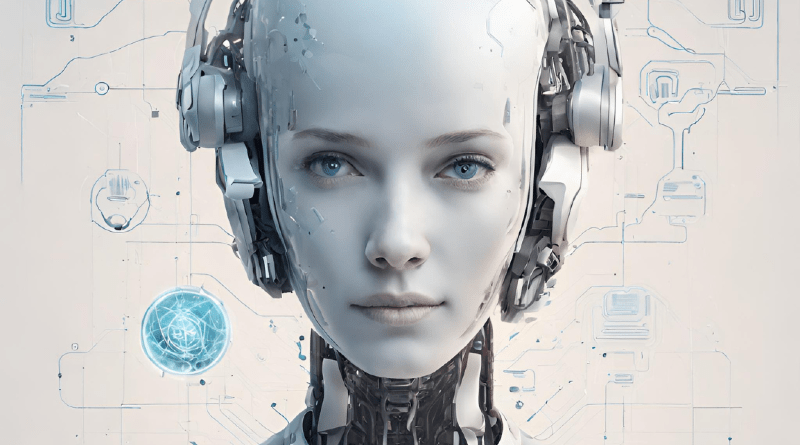AI in Marketing: Transforming Digital Strategies with Chat GPT
With the rise of artificial intelligence (AI) and the emergence of chat GPT technology, the world of digital marketing is undergoing a significant transformation. AI-powered technologies are revolutionizing the way businesses engage with their customers, optimize advertising campaigns, and deliver personalized experiences. In this blog post, we will explore the various ways in which AI, including chat GPT, is reshaping digital marketing. We will delve into AI-powered advertising, chatbots, and personalization in the technology industry. Through detailed explanations and real-world scenarios, we will provide insights into the historical context, current trends, and potential future implications of AI in marketing.

Section 1: Historical Context
Before delving into the present-day impact of AI in marketing, it is essential to understand the historical context that led to its emergence. The concept of AI dates back to the 1950s when pioneers like Alan Turing and John McCarthy explored the possibility of creating machines that could simulate human intelligence. However, it wasn’t until recent years that AI technologies gained significant traction and found practical applications in various industries, including marketing.
Subsection 1.1: AI’s Early Beginnings
In the early stages, AI in marketing primarily focused on data analysis and automation. Marketers used AI algorithms to process vast amounts of data and derive insights to guide their strategies. As technology advanced, AI evolved to encompass more complex tasks such as natural language processing, image recognition, and predictive analytics. These advancements opened up new avenues for AI integration into digital marketing, revolutionizing the way businesses interact with their customers.
Section 2: AI-Powered Advertising
One of the areas where AI has made a significant impact is in advertising. AI-powered advertising platforms are transforming the way brands target their audience, optimize campaigns, and maximize their return on investment. By leveraging AI algorithms, marketers can now deliver highly targeted ads to the right audience at the right time. Here are a few ways in which AI is revolutionizing advertising:

Subsection 2.1: Audience Segmentation and Targeting
AI algorithms can analyze vast amounts of data to identify patterns and segment audiences based on demographics, interests, and behavior. This enables marketers to create personalized campaigns that resonate with specific customer segments. For example, a clothing brand can use AI to identify potential customers who have shown an interest in similar fashion styles and target them with tailored advertisements.
Subsection 2.2: Smart Bidding and Campaign Optimization
AI-powered advertising platforms can optimize ad campaigns in real-time to maximize performance. These platforms use machine learning algorithms to analyze historical data, identify patterns, and make data-driven decisions on bid management and campaign optimization. For instance, an e-commerce retailer can use AI to automatically adjust bidding strategies based on factors such as the likelihood of conversion, cost per acquisition, and overall campaign performance.
Subsection 2.3: Ad Creative Generation
AI algorithms can also assist in generating ad creatives that are more likely to resonate with the target audience. By analyzing historical campaign data and understanding customer preferences, AI can suggest compelling visuals, copy variations, and even personalized messaging. This helps marketers optimize their ad creatives for better engagement and conversion rates.
AI-powered advertising platforms are already driving impressive results for businesses across various industries. For example, Airbnb leverages AI algorithms to optimize its advertising campaigns by adjusting bids based on factors like customer preferences, location, and demand. This resulted in a 50% increase in conversions and a 33% decrease in cost-per-acquisition.
Section 3: Chatbots
Another significant area where AI is transforming digital marketing is customer engagement and support. Chatbots, powered by AI and machine learning, are becoming increasingly prevalent on websites and messaging platforms. These virtual assistants can provide personalized and real-time interactions with customers, improving overall customer experience and driving business growth. Let’s explore some key advantages of AI-powered chatbots:

Subsection 3.1: 24/7 Availability and Instant Responses
Chatbots are available round the clock, providing instant responses to customer queries. This ensures that businesses can engage with their customers at any time, even outside of regular working hours. For instance, an e-commerce website may employ a chatbot that can provide product recommendations, answer frequently asked questions, and guide customers through the purchasing process, leading to increased sales and customer satisfaction.
Subsection 3.2: Efficient Lead Generation and Qualification
Chatbots can act as virtual sales assistants, engaging with website visitors, and helping identify potential leads. By collecting relevant information and understanding customer needs, chatbots can qualify leads and pass on the most promising ones to sales teams. This saves time for both customers and businesses, streamlining the lead generation process.
Subsection 3.3: Personalized Recommendations and Product Assistance
AI-powered chatbots can analyze customer data and provide personalized recommendations based on preferences, purchase history, and browsing behavior. This level of personalization enhances the customer experience and increases the likelihood of conversions. For example, a beauty retailer’s chatbot can recommend skincare products tailored to an individual’s skin type and concerns, leading to higher customer satisfaction and loyalty.
Chatbots are already making a significant impact in various industries. For instance, Bank of America introduced an AI-powered chatbot called Erica, which assists customers with banking tasks such as checking balances, transferring funds, and managing personal finances. Since its introduction, Erica has engaged with over 10 million Bank of America customers, demonstrating the value of AI-powered chatbots in enhancing customer experiences.
Section 4: Personalization in the Technology Industry
Personalization plays a crucial role in today’s digital marketing landscape. Customers expect tailored experiences that cater to their unique preferences and needs. AI technologies are enabling businesses in the technology industry to deliver highly personalized experiences at scale. Here are a few ways in which AI is driving personalization in the technology industry:

Subsection 4.1: Dynamic Content Generation
With AI, businesses can dynamically generate content based on user preferences and behavior. By analyzing data such as browsing history, purchase patterns, and demographic information, AI algorithms can automatically deliver personalized content to individual users. For instance, a news website can use AI to display articles that align with a user’s interests, resulting in increased engagement and time spent on the platform.
Subsection 4.2: Recommendation Engines
AI-powered recommendation engines have become a staple in many technology platforms. These engines analyze user data to understand preferences and make personalized recommendations. For example, streaming services like Netflix leverage AI algorithms to suggest movies and TV shows based on a user’s viewing history and ratings. This level of personalization enhances user satisfaction and encourages continued usage.
Subsection 4.3: Predictive Analytics
AI enables businesses to leverage predictive analytics to anticipate customer needs and provide proactive recommendations. By analyzing historical data and identifying patterns, AI algorithms can predict future behavior and personalize offerings accordingly. For instance, an e-commerce platform can use AI to recommend complementary products based on a customer’s previous purchases, increasing upsell and cross-sell opportunities.
The technology industry is witnessing the power of personalization through AI. Amazon, for instance, has revolutionized e-commerce by leveraging AI algorithms to provide personalized product recommendations and tailored shopping experiences. This has contributed to Amazon’s success as a leading global e-commerce platform.
Section 5: Current Trends and Future Implications
The impact of AI in marketing is only expected to grow in the coming years. As technology continues to advance, we can anticipate the following trends and implications for AI in marketing:
- Hyper-Personalization: AI will enable businesses to deliver even more personalized experiences by leveraging real-time data and advanced algorithms. Marketers will be able to create highly targeted campaigns that resonate with individual customers on a deeper level, resulting in increased engagement and conversions.
- Voice-Activated Marketing: With the rise of smart speakers and voice assistants, voice-activated marketing is becoming increasingly important. AI-powered voice recognition technologies will allow businesses to engage with customers through voice interfaces, providing a seamless and personalized experience.
- Ethical Considerations: As AI becomes more prevalent in marketing, ethical considerations will become crucial. Marketers will need to ensure that AI algorithms are used responsibly and transparently, avoiding biases and protecting user privacy. Striking a balance between personalization and data privacy will be a key challenge.
- Data-Driven Decision Making: AI will continue to empower marketers with data-driven insights, enabling them to make informed decisions and optimize their strategies. By leveraging AI algorithms to analyze vast amounts of data, marketers can identify trends, preferences, and behavior patterns, leading to more effective campaigns and better ROI.
Section 6: Conclusion
In conclusion, AI is transforming digital marketing at an unprecedented pace. From AI-powered advertising platforms to chatbots and personalized experiences, businesses are leveraging AI technologies to enhance customer engagement, optimize campaigns, and deliver tailored experiences. As we look to the future, the continued integration of AI in marketing will unlock new opportunities for businesses, revolutionizing the way they connect with customers and drive growth.




